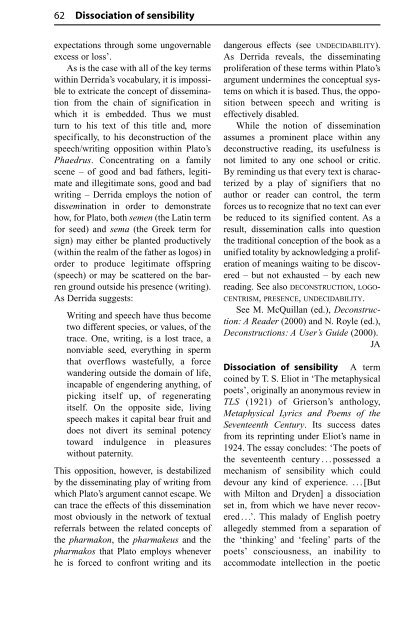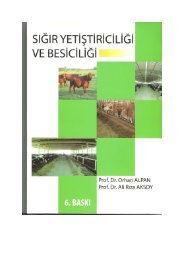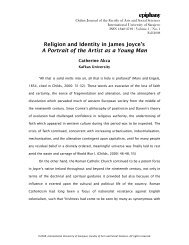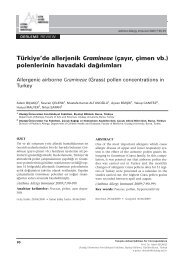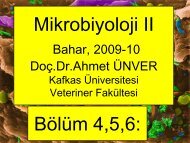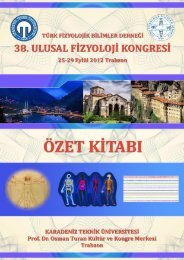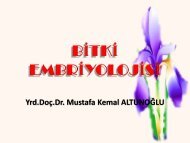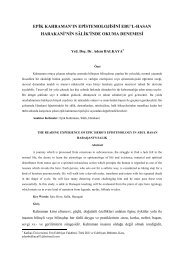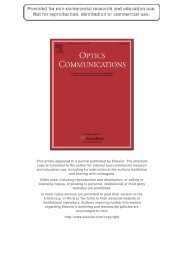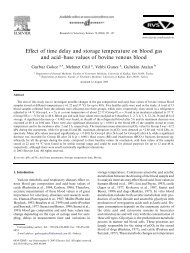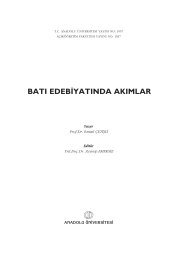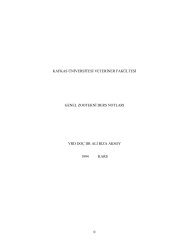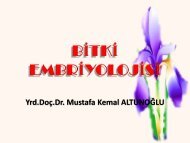The Routledge Dictionary of Literary Terms
The Routledge Dictionary of Literary Terms
The Routledge Dictionary of Literary Terms
Create successful ePaper yourself
Turn your PDF publications into a flip-book with our unique Google optimized e-Paper software.
62 Dissociation <strong>of</strong> sensibility<br />
expectations through some ungovernable<br />
excess or loss’.<br />
As is the case with all <strong>of</strong> the key terms<br />
within Derrida’s vocabulary, it is impossible<br />
to extricate the concept <strong>of</strong> dissemination<br />
from the chain <strong>of</strong> signification in<br />
which it is embedded. Thus we must<br />
turn to his text <strong>of</strong> this title and, more<br />
specifically, to his deconstruction <strong>of</strong> the<br />
speech/writing opposition within Plato’s<br />
Phaedrus. Concentrating on a family<br />
scene – <strong>of</strong> good and bad fathers, legitimate<br />
and illegitimate sons, good and bad<br />
writing – Derrida employs the notion <strong>of</strong><br />
dissemination in order to demonstrate<br />
how, for Plato, both semen (the Latin term<br />
for seed) and sema (the Greek term for<br />
sign) may either be planted productively<br />
(within the realm <strong>of</strong> the father as logos) in<br />
order to produce legitimate <strong>of</strong>fspring<br />
(speech) or may be scattered on the barren<br />
ground outside his presence (writing).<br />
As Derrida suggests:<br />
Writing and speech have thus become<br />
two different species, or values, <strong>of</strong> the<br />
trace. One, writing, is a lost trace, a<br />
nonviable seed, everything in sperm<br />
that overflows wastefully, a force<br />
wandering outside the domain <strong>of</strong> life,<br />
incapable <strong>of</strong> engendering anything, <strong>of</strong><br />
picking itself up, <strong>of</strong> regenerating<br />
itself. On the opposite side, living<br />
speech makes it capital bear fruit and<br />
does not divert its seminal potency<br />
toward indulgence in pleasures<br />
without paternity.<br />
This opposition, however, is destabilized<br />
by the disseminating play <strong>of</strong> writing from<br />
which Plato’s argument cannot escape. We<br />
can trace the effects <strong>of</strong> this dissemination<br />
most obviously in the network <strong>of</strong> textual<br />
referrals between the related concepts <strong>of</strong><br />
the pharmakon, the pharmakeus and the<br />
pharmakos that Plato employs whenever<br />
he is forced to confront writing and its<br />
dangerous effects (see UNDECIDABILITY).<br />
As Derrida reveals, the disseminating<br />
proliferation <strong>of</strong> these terms within Plato’s<br />
argument undermines the conceptual systems<br />
on which it is based. Thus, the opposition<br />
between speech and writing is<br />
effectively disabled.<br />
While the notion <strong>of</strong> dissemination<br />
assumes a prominent place within any<br />
deconstructive reading, its usefulness is<br />
not limited to any one school or critic.<br />
By reminding us that every text is characterized<br />
by a play <strong>of</strong> signifiers that no<br />
author or reader can control, the term<br />
forces us to recognize that no text can ever<br />
be reduced to its signified content. As a<br />
result, dissemination calls into question<br />
the traditional conception <strong>of</strong> the book as a<br />
unified totality by acknowledging a proliferation<br />
<strong>of</strong> meanings waiting to be discovered<br />
– but not exhausted – by each new<br />
reading. See also DECONSTRUCTION, LOGO-<br />
CENTRISM, PRESENCE, UNDECIDABILITY.<br />
See M. McQuillan (ed.), Deconstruction:<br />
A Reader (2000) and N. Royle (ed.),<br />
Deconstructions: A User’s Guide (2000).<br />
JA<br />
Dissociation <strong>of</strong> sensibility A term<br />
coined by T. S. Eliot in ‘<strong>The</strong> metaphysical<br />
poets’, originally an anonymous review in<br />
TLS (1921) <strong>of</strong> Grierson’s anthology,<br />
Metaphysical Lyrics and Poems <strong>of</strong> the<br />
Seventeenth Century. Its success dates<br />
from its reprinting under Eliot’s name in<br />
1924. <strong>The</strong> essay concludes: ‘<strong>The</strong> poets <strong>of</strong><br />
the seventeenth century...possessed a<br />
mechanism <strong>of</strong> sensibility which could<br />
devour any kind <strong>of</strong> experience. . . . [But<br />
with Milton and Dryden] a dissociation<br />
set in, from which we have never recovered...’.<br />
This malady <strong>of</strong> English poetry<br />
allegedly stemmed from a separation <strong>of</strong><br />
the ‘thinking’ and ‘feeling’ parts <strong>of</strong> the<br />
poets’ consciousness, an inability to<br />
accommodate intellection in the poetic


